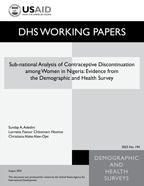There is no printed copy available to order.
Abstract:
Despite efforts to increase contraceptive use
in Nigeria, the relevant indicators have
remained poor. Nigeria’s modern contraceptive
prevalence rate (mCPR) of 12% is one of the
lowest in the world. The contraceptive
discontinuation rate among women in Nigeria
is high at 41%. A sub-national analysis of
Nigeria’s mCPR reveals a dismal situation,
with mCPR ranging from 2% in Sokoto State
(North West) and Yobe State (North East) to
29% in Lagos State (South West). This study
examined the reasons and determinants of
contraceptive discontinuation across sub-
national levels in Nigeria. Data for the
study came from the individual women’s
recode of the 2018 Nigeria Demographic and
Health Survey, with a weighted total of
180,999 events (birth, pregnancy,
termination, and contraceptive use) in the 5
years before the survey; 10,384 episodes of
contraceptive use; and 6,365 episodes of
discontinuation among 4,974 women age 15–49.
Relationships between the dependent
variable (contraceptive discontinuation) and
the explanatory variables were explored with
the Cox proportional hazards model. The
results show a substantial disparity in
contraceptive discontinuation episodes across
the six regions of Nigeria – highest in the
South West (28.0%), and lowest in the North
East (11.1%). The discontinuation rate for
all methods was lowest in the South West
(32.5%) and highest in the North West
(50.1%). Across most regions, the highest
discontinuation rate was attributed to
pregnancy or fertility-related reasons. The
Cox models indicate that, when compared to
the South West Region, the risks of
discontinuing contraceptives were
significantly higher in North Central and
North West (hazard ratio (HR) = 1.4, 95%
confidence interval (CI) [1.2, 1.7] p <
.001), South East (HR = 1.5, 95% CI [1.2,
1.9] p < .001), and North East (HR = 1.3, 95%
CI [1.0, 1.5] p < .05). The study suggests
the need for context-specific family planning
programming that considers the country’s
diversity when addressing the problem of
contraceptive discontinuation in order to
ensure better reproductive health outcomes in
Nigeria.
 Sub-national Analysis of Contraceptive Discontinuation among Women in Nigeria: Evidence from the Demographic and Health Survey (PDF, 1005K)
Sub-national Analysis of Contraceptive Discontinuation among Women in Nigeria: Evidence from the Demographic and Health Survey (PDF, 1005K)
